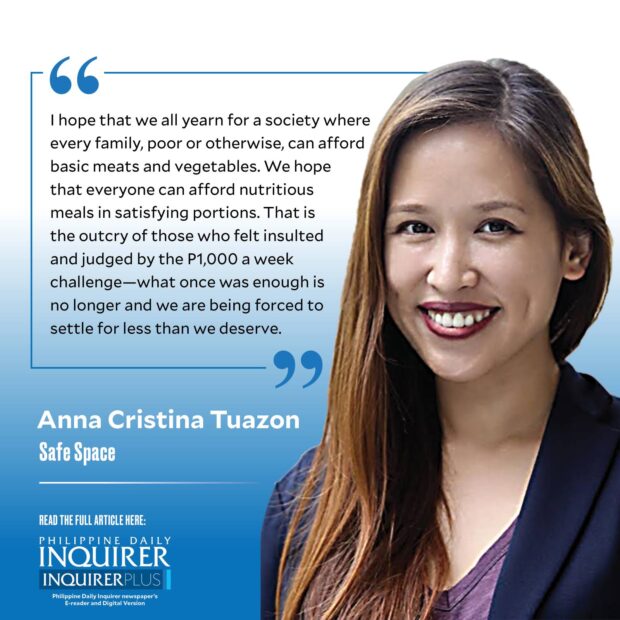Too ‘wais’ for our own good
Filipino netizens were in an uproar last week over a celebrity’s posting of a suggested P1,000 family meal plan for a week. The meal plan—that did not include any costing—included pork, chicken, fish, and vegetables. It did not include rice. Netizens rightly pointed out that the meats alone, for a family of four or five, would cost more than the entire budget. The rising costs of vegetables would also not help in meeting the budget. Even the suggestion that people can eat leftovers for dinner will not solve the issue as one would have to prepare twice the portions to make sure there is still something to eat at the end of the day. The celebrity initially defended her post by stating that the vegetables were meant to be taken from one’s own garden and the eggs from one’s own chickens. The post has since been taken down.
I have been mildly following the celebrity’s homemaking and business exploits over the last few years and admire her for her hard work and discipline. While the intention to help cannot be faulted, it did show glaring blind spots of privilege as well as ignorance of what has caused so much negative reaction.
What is wrong with a P1,000 a week challenge? First, it puts the onus of the food crisis as simply a matter of individual skill, that of “wais” and “diskarte.” Instead of validating that the value of our money has shrunk considerably within the last few years, we have instead judged others as simply not being “madiskarte” enough or worse, that they are merely entitled. Some defending comments have said they can succeed if only we eat instant pancit canton or canned sardines every day. They make it sound like wanting fresh meats and produce is an entitlement and not a right that should be enjoyed by all. They judge people who buy groceries from the supermarket rather than the public markets. For some, supermarkets might still be the most geographically accessible, given that transportation costs have also risen. We actually switched to public markets after supermarkets have become a painful luxury but even then, with only one dish a day, we could only budget down to P2,000 a week for a family of two.
What is diskarte? It is the capacity to find creative solutions in a challenging situation. Diskarte in this context can be the skill of haggling down prices (which would lessen market vendors’ already meager earnings) or knowing where the cheapest goods can be found (by knowing the right people). I dare say every Filipino is madiskarte to a degree—one cannot survive in this country otherwise. We know how to deal with blackouts and water shortages. The “padrino” system is another manifestation of diskarte: because we cannot rely on the existing infrastructure to serve our needs, we have created back door processes. Wais is similar to diskarte, loosely translated to street smarts. It highlights practicality—and in the case of meal planning, of frugality.
What is the harm in emphasizing wais and diskarte? By doing so, we have ignored that it takes resources and privilege to do so. For example, with the suggestion that people should simply plant their own vegetables to maximize their budget, it doesn’t take into consideration that farming requires land, time, money, and know-how. It assumes that people have the luxury of space, an ever-precious commodity in the cities. Even with container gardening, this still requires access to fertile soil and adequate sunlight. It also takes some financial investment to farm: seeds, soil, and water do not come free. One also needs the luxury of time. Advocates of homesteading—those that aim to grow their own food in order to reach self-sufficiency—highlight that one needs to grow A LOT of food if one plans to reach this goal. This requires sizable land, water, and frequent tending. In order to have access to fresh produce in your own backyard every day, one must also be knowledgeable in food preservation and have the storage space for your stockpile in between harvests. In a way, giving a suggestion like “just plant your own food” can be just as dismissive and unrealistic as “just earn more money” in that both require skill, resources, and a lot of luck.
Another harm of focusing on wais and diskarte is that it side-steps the real issue: our purchasing power is at an all-time low. It is a red herring to figure out who is wais enough. If one were given a choice between your P1,000 being able to buy only pancit canton and your P1,000 being able to buy pork, chicken, and fresh produce, what would you choose? If you were truly wais, this will be a no-brainer. I hope that we all yearn for a society where every family, poor or otherwise, can afford basic meats and vegetables. We hope that everyone can afford nutritious meals in satisfying portions. That is the outcry of those who felt insulted and judged by the P1,000 a week challenge—what once was enough is no longer and we are being forced to settle for less than we deserve.
—————-
















